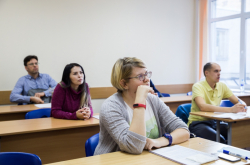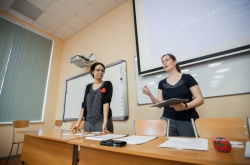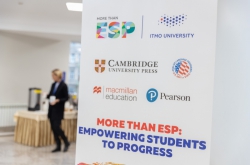In February 2017, ten ITMO staff went to the University of Arizona to participate in a special Content Area Teacher Training course which is offered to university academics from all around the world to improve their skills in teaching EMI courses at their universities. A few months later, during the summer, some workshops on English Medium Instruction (EMI) were also organized for ITMO’s lecturers.
At the start of this academic year, ITMO implemented its own 72 academic hour teacher training course for its professors and lecturers. The first pilot group of lecturers who participated in the course were from the High-Performance Computing department and eScience Research Institute, most of whom are involved in teaching English-language Master’s programs. Soon after, another course was launched which included lecturers from all around the university.
“EMI courses are aimed at preparing teachers to conduct their classes in English for students for whom English is not their native language. The courses do not teach so much the language but rather how to teach using it. The course covers how to built and fill your classes such that you can convey to the student the maximum amount of useful information. However, all this knowledge is to some extent universal and is thus useful in preparing a lesson for any group of students” explained Alexey Asach, Senior Lecturer from the Department of Thermophysics and Basics of Heat-Cooling Technology.
To participate in the course, lecturers must have a strong English language level that allows them to effectively engage in the course and to be able to teach in English. This is confirmed by an English language placement test and a short interview.

The purpose of the course is to give lecturers an opportunity to reflect on their current teaching methods and adapt their materials and teaching approaches to an English medium instruction classroom. A large focus is put on implementing interactive strategies in the classroom to help students, often not native English speakers, to retain information better. Lecturers also designed their own syllabus in English and several useful tools such as assessments and rubrics that they can use in their future classes. Other important elements of EMI classes like intercultural communication and practice in teaching and presenting in English are also given a strong emphasis.
“The course is interesting and very useful both in terms of an in-depth understanding of the general principles of course development and in terms of the nature of teaching in a multilingual environment. A positive feature, in my opinion, is the interactive form of teaching, which allows not only to learn the material in more detail, but also to get acquainted with the opinion and experience of other students of the course. I would recommend this course to both teachers who are already teaching courses in English and those who are just planning to change the language of the courses they are teaching,” said Sergey Kovalchuk, Senior Research Associate at the eScience Research Institute.
In March, the course was offered again with an online component, nearly 24 of the 72 hours could be done at home. This new blended approach proved to be particularly effective as some topics were more suitable for home study, and travelling between buildings across the city for classes was a challenge for most participants. The course was successfully offered using vkontakte and Google drive as platforms but next semester the online components will be transferred to Moodle, which is being launched as the online learning platform for the Foreign Language Training Center.
“In my opinion, this is a wonderful course where you can not only learn about the latest teaching approaches but also significantly improve your level of spoken English,” shared Artur Abdullin, Associate Professor at the Department of Electrical Engineering and Precision Electromechanical Systems.

“A great course for all teachers, regardless of experience or field. A good opportunity to look at yourself from a different angle and get objective feedback from colleagues, as well as to overcome the language barrier and improve your public speaking skills in English,” explained Alexandra Karabintseva, also from the eScience Research Institute.
About 35 lecturers have already completed the 72-hour professional development course. All lecturers who complete the course requirements are issued special professional development certificates in both English and Russian.
Now an online sharing platform has been implemented for lecturers to form a community of practice and continue to share their experiences and best practices of teaching in English.
The course is continuously improving and will be offered again at the start of the academic year. For more information: emi@corp.ifmo.ru




